We surveyed just over 1,000 Americans ages 18 and over to better understand what’s driving their current stress levels and how they feel about seeking professional help. The results indicate many people are shouldering concerns over common stressors, like money, health, and politics while forgoing professional help.
Key Takeaways
2 in 3 Americans are more stressed this year compared to last year.
29% of Americans cite personal finances as the No. 1 cause of stress.
1 in 4 Americans have concerns about artificial intelligence (AI) replacing their job.
Despite more stress, nearly half of Americans are not at all likely to speak with a therapist about their concerns.
A Stressful Year
When asked how their stress levels were compared to last year, roughly 2 in 3 people said they are at least somewhat more stressed this year, with 25% saying their stress level is much higher.
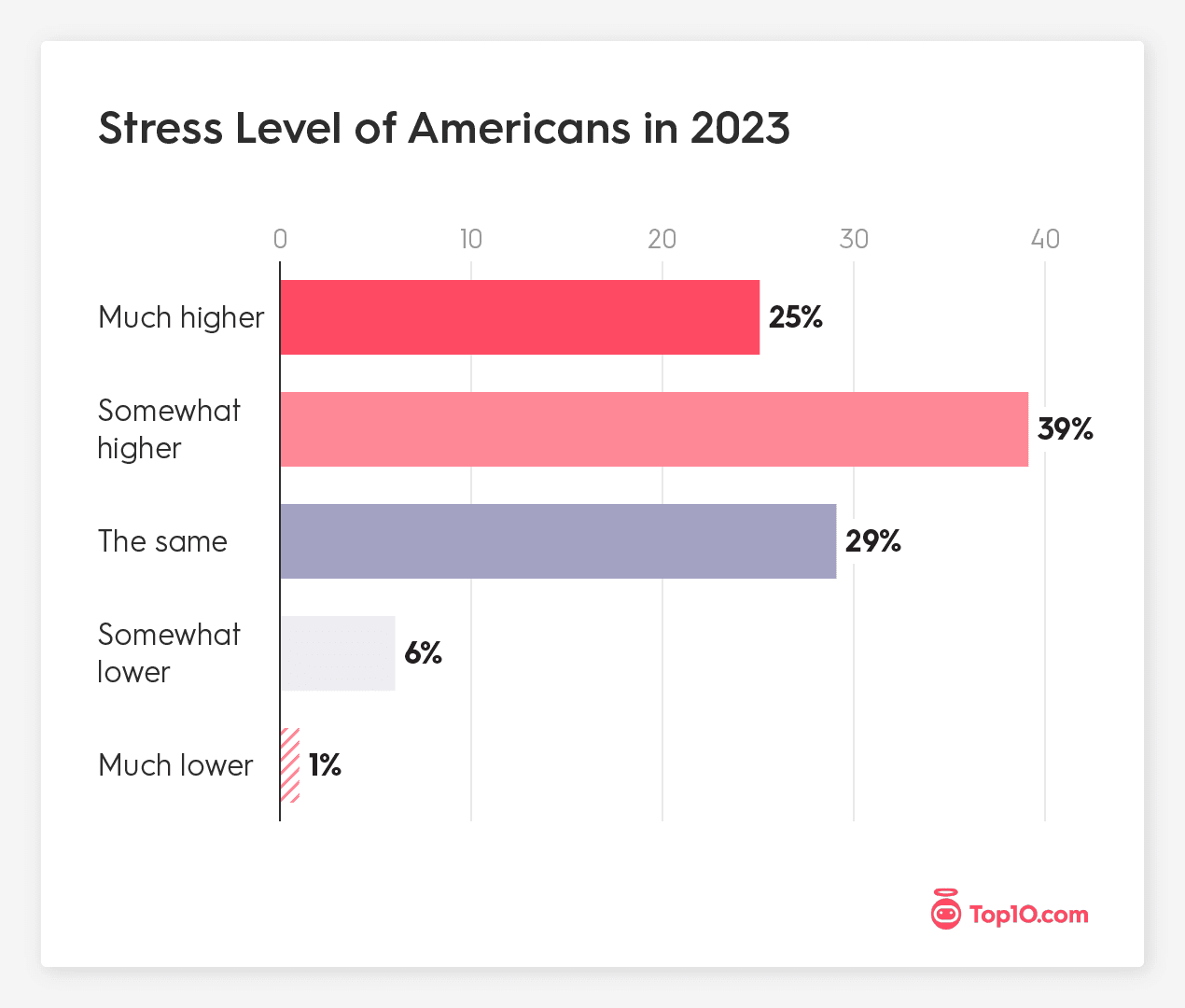
Of those with higher stress:
Women (68%) were more likely than men (59%) to report being more stressed.
45- to 60-year-olds were the most common age demographic to report “much higher” stress levels (31%).
- 49% of 18- to 29-year-olds reported somewhat higher stress levels than last year.
That stress levels are rising among Americans is perhaps unsurprising given the events of the past year, including global tensions, recession fears, and inflation.
“Economic concerns, particularly worries about stagnant wages and the rising cost of living, undoubtedly contribute to this increased stress,” says Kevin Huffman, a doctor of osteopathic medicine and a licensed fitness, mental health, and wellness specialist.
Personal Finances Are a Top Stressor
When respondents were asked what caused them the most stress this year, 29% reported personal finances, with 30- to 44-year-olds being the most affected.
These findings square with other research. A recent CNBC Your Money Survey found that 74% of Americans feel stressed about personal finances.
Among our respondents who reported “much higher” stress, 2 in 3 (67.18%) cited personal finances or the economy as their top concern.
Past traumas and media influence are likely causing Americans to stress over a potential recession, says Niloufar Esmaeilpour, an MSc, registered clinical counselor, and somatic experiencing practitioner at Lotus Therapy & Counseling Center.
“Memories of previous recessions, like the 2008 financial crisis, can have a lingering impact,” Esmaeilpour says. “People fear job loss, depleting savings, and an uncertain future … Negative news can foster a sense of doom and uncertainty.”
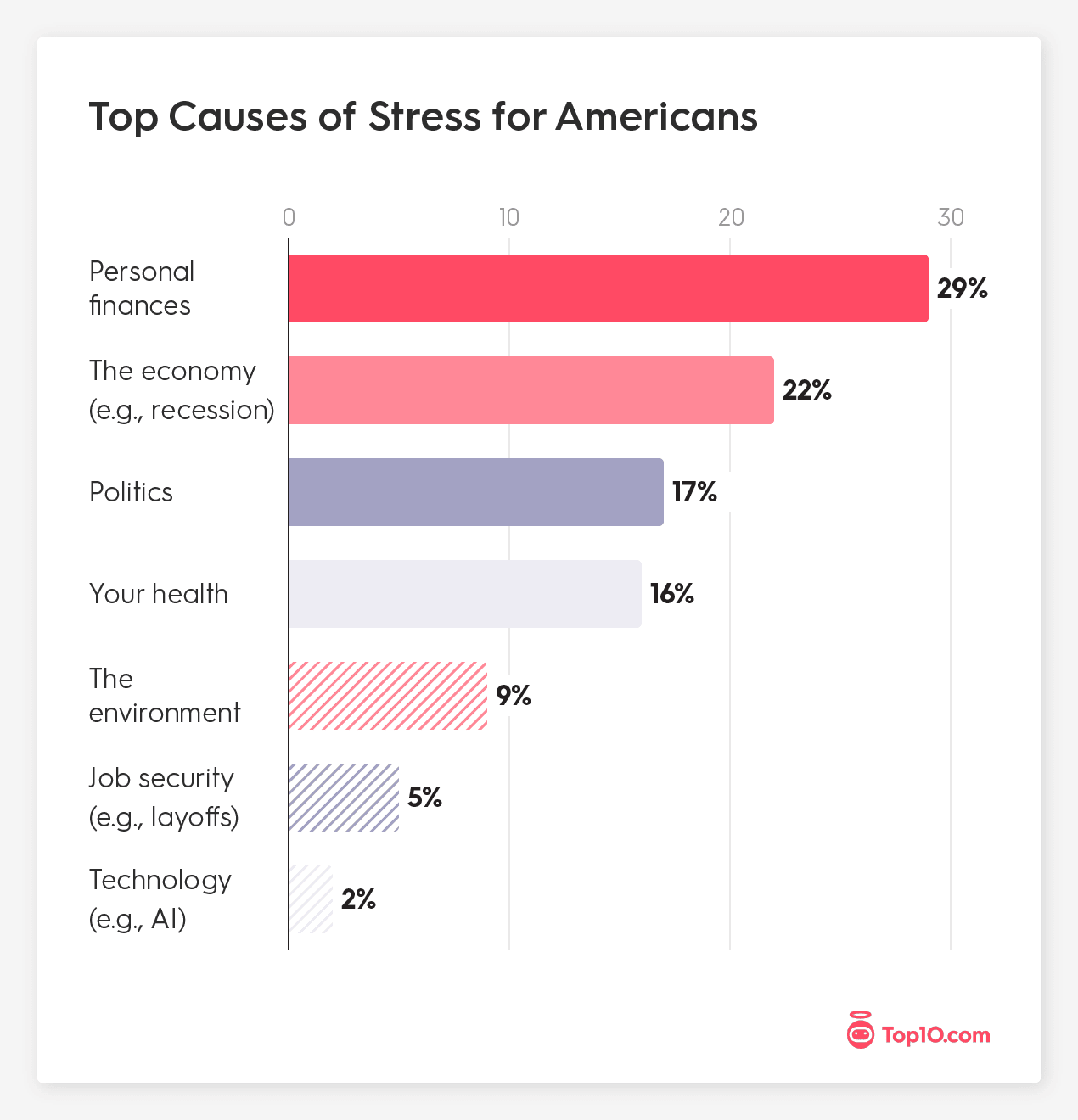
Other stressors include politics (17%) and personal health (16%), though it’s worth noting that all these concerns can exacerbate one another.
“The pressure of meeting financial obligations in the face of economic uncertainty can lead to anxiety and strain mental health,” Huffman says.
More than any other demographic, people 60 and older cite politics as the top stressor (33.53%). Men reported being more stressed than women about politics (21% vs. 14%). Additionally, nearly 1 in 10 say the environment is their top concern.
The AI Factor
Despite economic worries, only 1 in 20 worry about their job security. However, over 1 in 4 people are at least somewhat worried about a potential AI takeover.
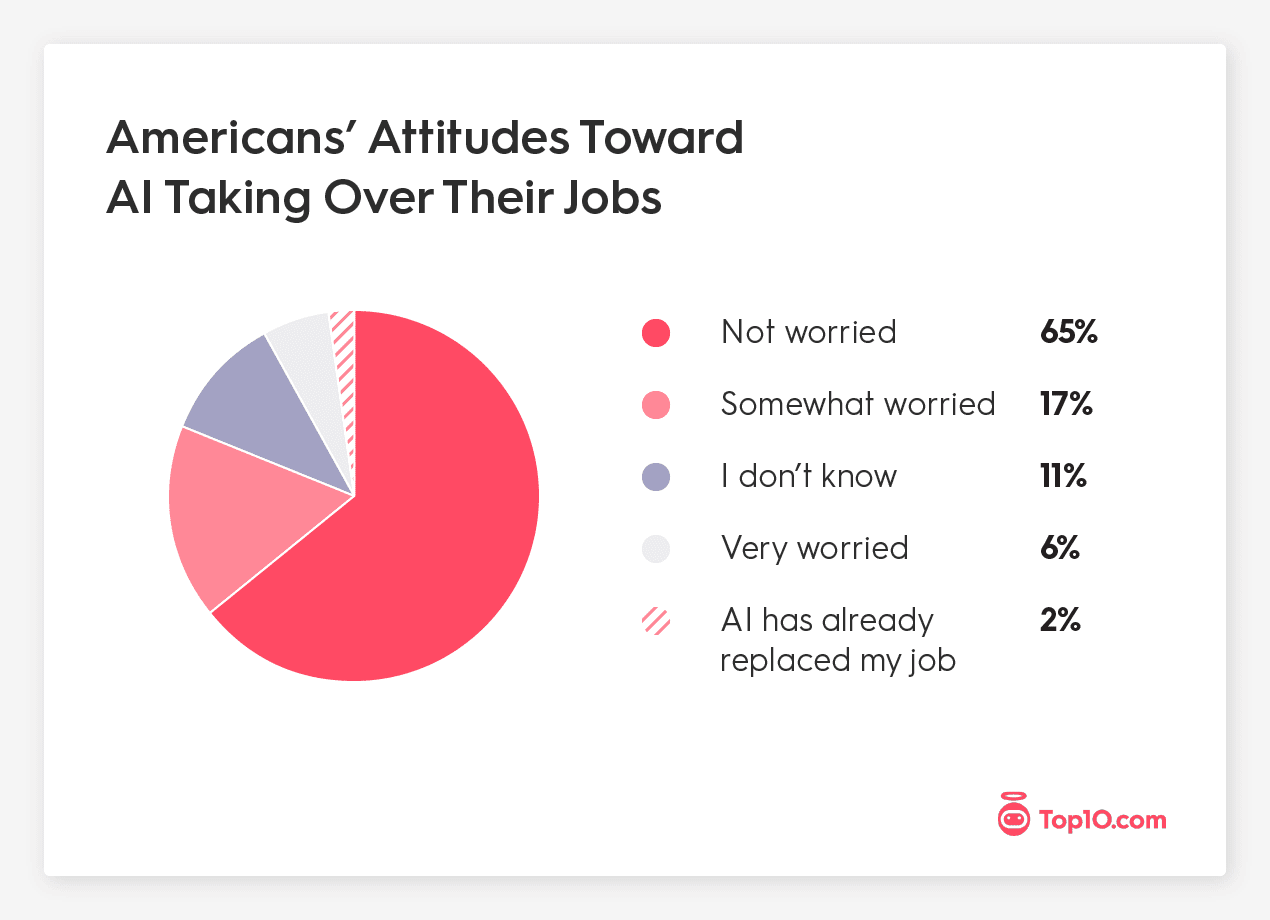
Respondents whose stress levels are “much higher” this year were more likely to fear AI replacing their job, with 1 in 3 (33.98%) at least somewhat worried about this scenario. These figures are perhaps surprising, considering how new the technology is, though AI did dominate headlines this year.
Holding Out on Help
When asked how likely they would be to seek a therapist about their concerns, nearly half of Americans responded they were not at all likely to speak to a therapist despite experiencing more stress this year. Nearly 2 in 10 stated that they would be somewhat likely to seek a therapist, and only 4% are currently seeing a therapist.
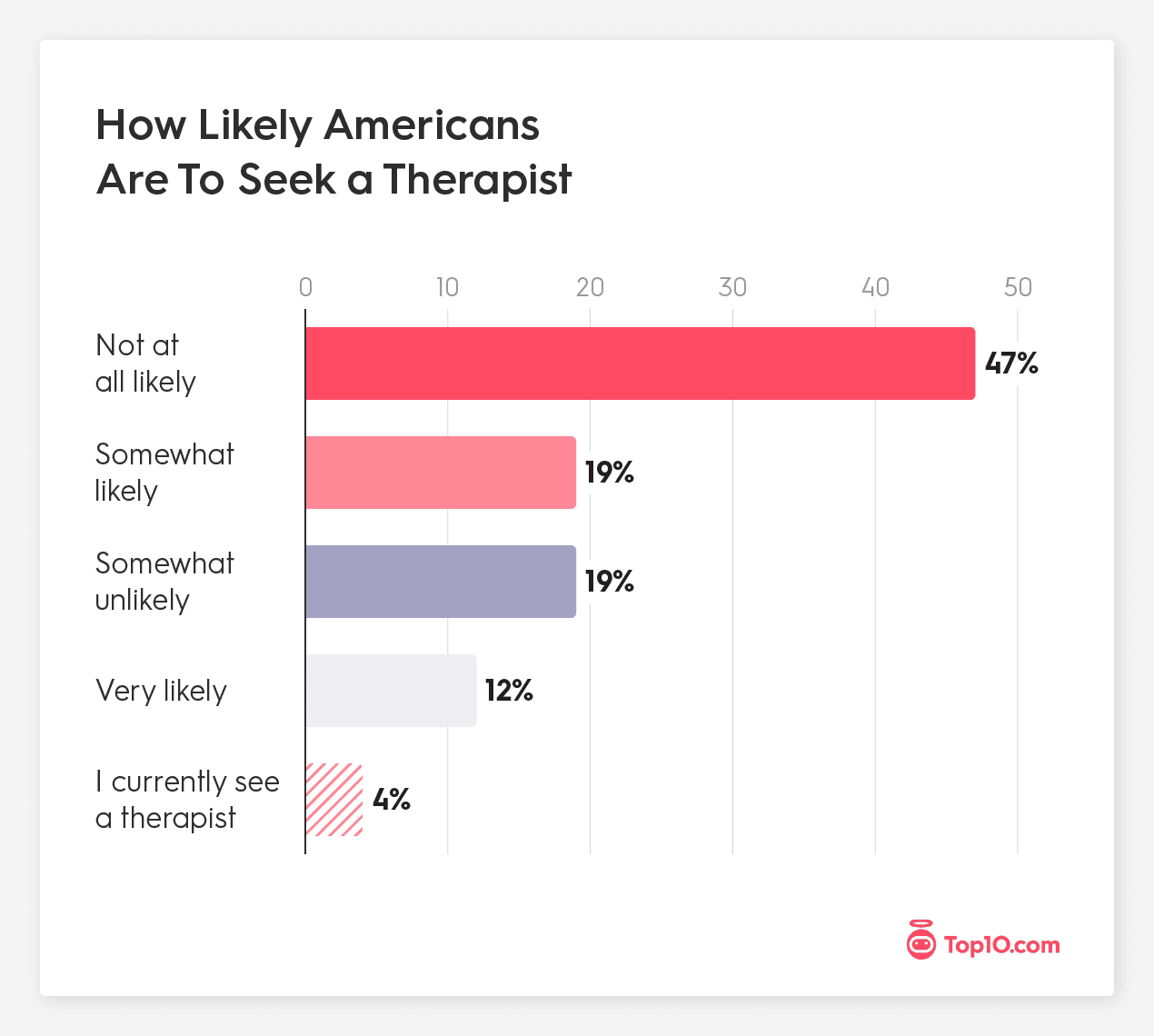
Among the cohort with “much higher” stress, roughly 4 in 10 (39.38%) still say they are not at all likely to seek therapy. Meanwhile, about 43% of those experiencing higher stress are at least somewhat likely to speak with a therapist.
We looked at differences among genders and found:
- 51% of men are not at all likely to see a therapist, compared to 43% of women.
- 1 in 3 women are at least somewhat likely to speak with a therapist about their concerns compared to about 28% of men.
This gender disparity can stem from social stigmas around men sharing their feelings.
When looking at age differences, people 60 and over are the least likely to see a therapist for their concerns (66%), followed by people ages 45 to 60 (42%). Of the respondents currently seeing a therapist, 6% are ages 18 to 29, and 4% are 60 and over.
The findings align with other research suggesting younger generations are more comfortable and open with mental health. The American Psychological Association found that Generation Z is the most likely to voice mental health concerns over other demographics.
Why Americans Are Forgoing Therapy
When asked why they wouldn’t seek out a therapist, some 26% said that they don’t believe therapy would be helpful to them. Other reasons include not having the time (17%), not trusting therapists (8%), and a fear of being judged (7%).
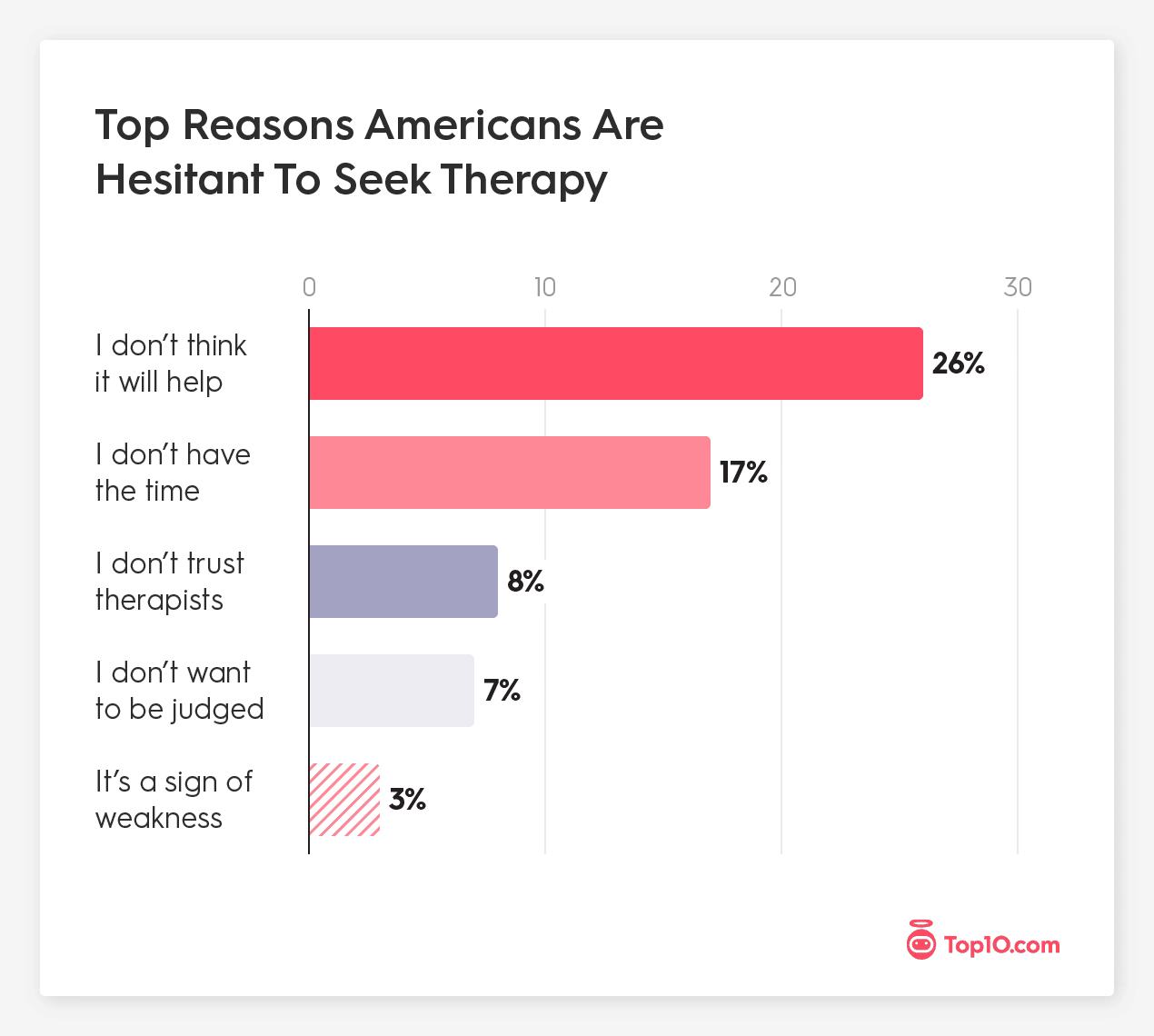
When looking at gender breakdowns, more men than women responded that they would distrust a therapist (10% vs 6%) but both genders have an equal fear of being judged (7%). People ages 30 to 44 said they have no time to see a therapist (29%). Also, 45- to 60-year-olds are the least likely to trust therapists (11%) and fear being judged the most (10%).
Given Americans’ higher stress levels, the findings suggest there is a pervasive stigma in the U.S. around seeking help. In fact, a recent study published in the journal Psychological Medicine found the stigma attached to mental illness continues to be a significant deterrent to receiving treatment.
Top 10 Self-Care Tips
Caring for and boosting your mental health is essential. If you or someone you know are suffering from stress, anxiety, or other mental health issues, seek out a licensed, trained professional. Integrating self-care habits into your life can also help you cope, enhance your overall wellness, and foster resilience.
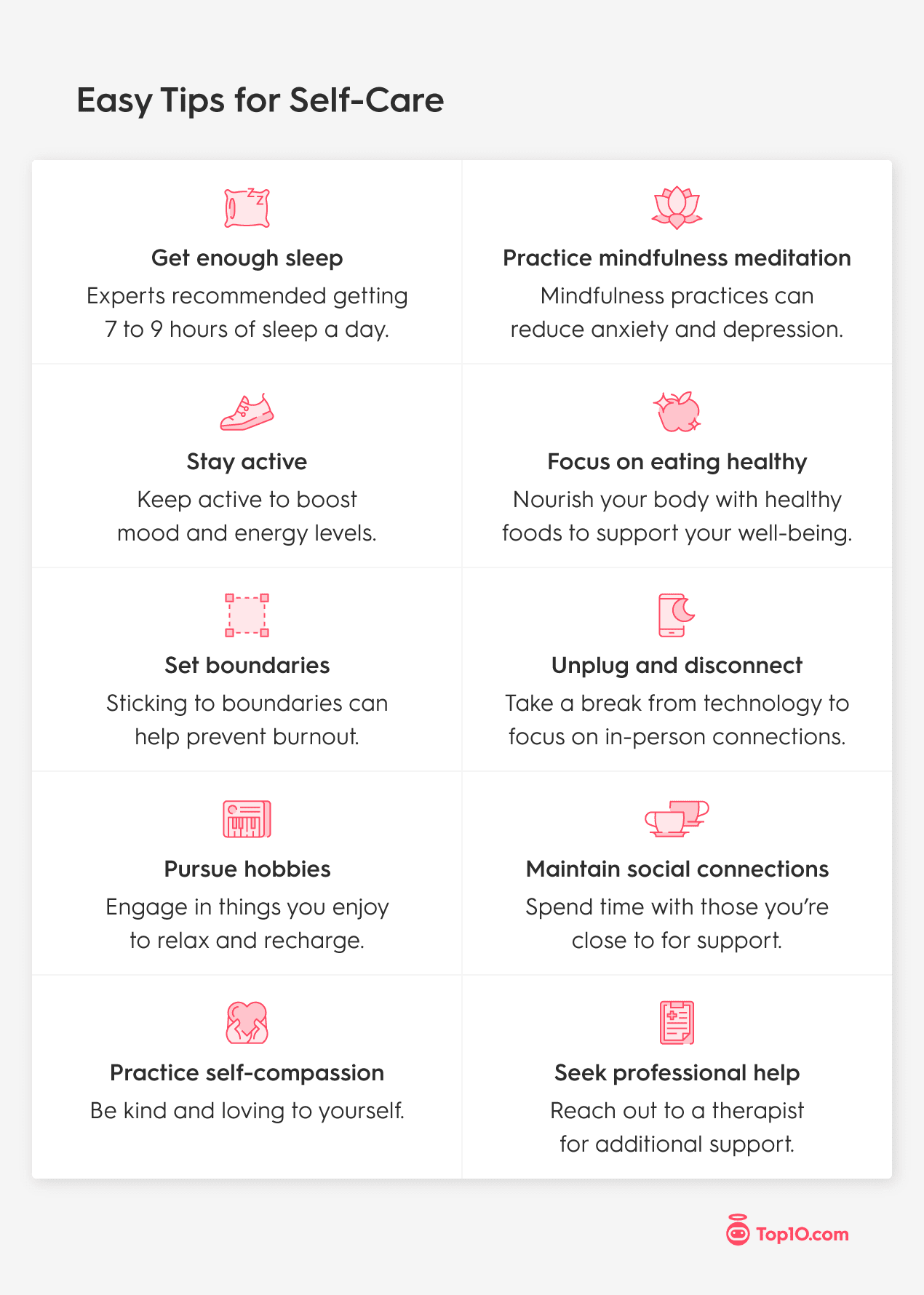
Here are our top 10 self-care tips to help you cope with stress and prioritize your needs.
- Get enough sleep. Ensure you sleep well each night to rejuvenate your body and mind. According to the American Academy of Sleep Medicine and Sleep Research Society, people require a minimum of eight hours of sleep for optimal health. For a more restful sleep, consider reducing screen time before bed. “Blue light from devices can disrupt the production of melatonin, a hormone that regulates sleep,” Esmaeilpour says.
- Practice mindfulness meditation. Dedicate a few minutes each day to mindfulness meditation to reduce stress and increase self-awareness. Mindfulness practices are proven to reduce depression and anxiety. This practice can improve quality of life and reduce mental health symptoms, Dr. Zev Schuman-Olivier of Harvard University told the National Institutes of Health (NIH).
- Stay active. Engage in regular physical activity that you enjoy, like yoga, jogging, dancing, or hiking, to boost your mood and energy levels. If you’re just starting, consider setting realistic goals to help you stay motivated to exercise. Engaging in activities like strength training can “not only improve physical health but can also enhance mental health by releasing endorphins, which are natural mood lifters,” Esmaeilpour says.
- Focus on eating healthy. Nourish your body with a balanced diet rich in fruits, vegetables, lean proteins, and whole grains. “Consuming nutrient-rich foods fuels both our bodies and minds, promoting optimal health,” Huffman says. “It's important to limit the intake of excessive caffeine and sugar, as they can worsen feelings of anxiety.”
- Set boundaries. According to research, there is a strong link between mental health issues, including depression, anxiety, and burnout. “It’s important to recognize when it's necessary to say 'no' and set limits on work-related demands, allowing time for relaxation and personal activities,” Huffman says.
- Unplug and disconnect. Take breaks from screens and social media to reduce digital stress and focus on in-person connections. A study from Yale University found that youth who spent the majority of their day using technology were more likely to experience depression, anxiety, social anxiety, and more two years later.
- Pursue hobbies. Engage in hobbies — even hobbies from home — or activities that bring you joy and fulfillment, helping you relax and recharge. Physical activity hobbies have been linked to many health benefits, including a lowered heart rate, reduced blood pressure, and reduced stress, writes Emma Parkhurst, Professional Practice Extension Assistant Professor at Utah State University.
- Maintain social connections: Spend time with friends and loved ones to build and strengthen your support network. According to a meta-analysis published in the Journal of Personality and Social Psychology in 2020, having high self-esteem and satisfying social connections are closely related.
- Practice self-compassion. Be kind and forgiving toward yourself, recognizing that imperfections are a part of being human. People who practice self-compassion are less likely to experience anxiety, tension, or depression, according to research by self-compassion specialist Kristin Neff.
- Seek professional help. Again, don't hesitate to reach out to therapists or counselors when necessary; seeking professional support is essential to self-care. You can even consider therapy online, which you can do from a computer, phone, or tablet. Start by reviewing our top 10 best online therapy services.
Methodology
The survey of 1,042 adults ages 18 and over was conducted via SurveyMonkey Audience for Top10 on Sept. 5, 2023. Data is unweighted and the margin of error is approximately +/-3% for the overall sample with a 95% confidence level.

